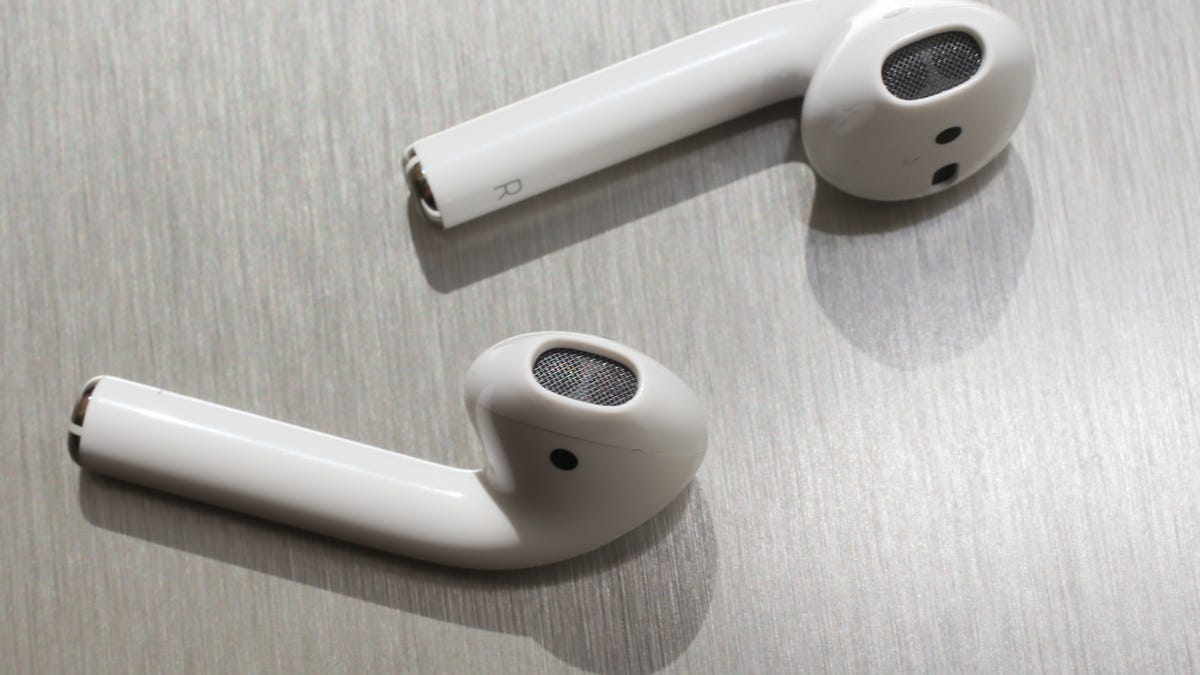Apple's AirPods may look weird, but they'll change the headphone market
While this type of totally wireless earbud-style headphone has been available for the last year, Apple's version of them will be a game changer.

When Apple launched the iPhone 7 and 7 Plus, a lot people were expecting it to announce new wireless headphones from Beats, which it acquired last year, and a wireless version of its EarPods that rumor had it would be called AirPods.
The new Beats did indeed materialize in the form of next-gen versions of its current models -- the Powerbeats3 ($200) and Solo3 Wireless ($300) -- as well the all-new BeatsX ($150). But it's the new $159 (£159, AU$229) AirPods, due to ship in late October, that have created the biggest stir.
Yeah, they happen to be a wireless version of the ubiquitous white Apple earbud, seemingly the most popular default headphones in the world. But more strikingly, they're totally wireless earbuds, which makes them different from anything that Beats has. And they also use a new proprietary W1 chip that Apple has developed (the new Beats also use the W1 chip).
That chip is being described as custom hardware that uses ultralow-power Bluetooth and keeps the two earbuds in sync.
According to Apple, the W1 chip has dual optical sensors and accelerometers in each AirPod that work with the W1 chip to detect when the AirPods are in your ears, so they only play when you're ready to listen. You access Siri with a double tap to the AirPods and select and control your music, adjust volumes and check your battery life with voice commands. "An additional accelerometer in each AirPod detects when you're speaking, enabling a pair of beam-forming microphones to focus on the sound of your voice," Apple adds, "filtering out external noise to make your voice sound clearer than ever before."
AirPods work with non Apple Bluetooth audio devices, but you can't access their special features unless you're using them with an Apple device running iOS 10, watchOS 3 or macOS Sierra. As an Apple rep obliquely put it: "AirPods do work with non-Apple devices via Bluetooth. You lose the magic as a result." We'll have to dig a little deeper into that comment while playing Barry Manilow's "Could It Be Magic" once we get a review sample, but at least AirPods are compatible with legacy iPhones, not just the iPhone 7 and 7 Plus.
More from Apple's event
I haven't used the new AirPods yet, but CNET editor Scott Stein got a chance to spend a few minutes with them at the launch event and thought they sounded pretty good and were comfortable to wear. That's not saying much, but I think it's pretty safe to assume they share very similar design traits to the EarPods -- they just don't have any wires.
Apple isn't the first to come out with totally wireless earbuds. In last year we've seen several companies -- and a lot of Kickstarter and Indiegogo campaigns -- hawking these types of wireless headphones. I've tried a few pairs and have liked the models I'm using now from Erato (the Apollo 7) and Earin. They work surprisingly well, though they're expensive (around $280). And plenty more totally wireless headphones are on the way, including Bragi's The Headphone, Doppler Labs' Here One, Jabra's Elite Sport and Samsung's Gear IconX.
I've been skeptical of these types of totally wireless earphones. My early experiences them were marred by inconsistent connections and poor fit. But the Erato Apollo 7 in particular has changed my mind. It's not perfect -- there's some lag when watching video or playing games -- but it's worked smoothly, with few hiccups (the two buds mostly remain synced), the sound quality is good, and they fit comfortably with a tight seal.
I was worried about losing the little buds, but when I'm finished listening, I stick them in their charging case, and put the case in my pocket. Battery life is around four to five hours, but they charge quickly in their charging case.
Apple AirPods also come with a charging case and their battery life is rated at five hours. However, the charging case provides an extra 24 hours of battery life, according to Apple. Three to five hours is the current standard for totally wireless stereo earbuds so the AirPods battery life is in line with that or slightly better.
The AirPods won't be perfect either. As with most in-ear headphones, they won't necessarily fit everyone's ears -- or stay in them -- and it'd be nice if you could run in them. (Apple isn't positioning the AirPods as workout headphone, but it would be nice if they were.) I'm also curious how good they are for making calls -- my hunch is they're pretty good.
If they're as easy to pair with your phone and have as rock-solid a connection as Apple is saying they have, they're going to be game-changers. The fact is, once you go totally wireless, it's hard to go back to wires, and with Apple's backing behind this new type of headphone -- and a $159 price tag that's not too outrageous -- you may soon be looking at a lot people wearing the same white earbuds but with no wires between them.
CNET's Scott Stein contributed to this story. He wrote a subsequent hands-on preview of the AirPods that you can find here.
Updated 7:03 p.m. PT with compatibility specifics.

